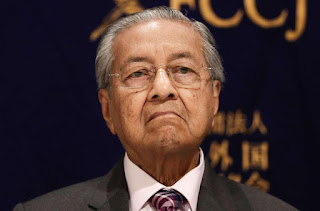
Mahathir Mohamad loses his seat in the Malaysian parliament
Former Malaysian Prime Minister Mahathir Mohamad, 97, lost his seat in parliament following the legislative elections that took place on Saturday, which threatens to put an end to the long career of this veteran politician who was hoping to return to the political scene.
Mahathir, who served as Malaysia's prime minister for more than two decades in two terms, failed to retain his parliamentary seat and came fourth in a competition contested by five candidates in the Langkawi island constituency.
The seat was won by a candidate from the National Alliance, which is led by another former prime minister, Muhyiddin Yassin.
Mahathir leads a coalition that pledged to overthrow the current National Front coalition government on the grounds of accusations of corruption, but his alliance is not a major competitor, as the Front faces two other major coalitions, the Muhyiddin bloc and another led by Anwar Ibrahim, Mahathir's arch-rival for a long time.
Mahathir said in an interview with Reuters this month that he would retire from politics if he lost.
Millions of voters went to the polls to participate in the national elections, which were called early, in an attempt to end the political instability.
The election is the first since the historic vote in 2018, when the party, which has ruled the Southeast Asian country since its independence in 1957, was defeated in the wake of a multibillion-dollar corruption scandal.
A single party is unlikely to win an outright majority in the 222-seat House of Representatives, and the majority of the major parties have campaigned under one banner, in a race between three major alliances.
Three successive prime ministers in the country within 3 years, including Mahathir Mohamad, 97, who ruled Malaysia for more than two decades during two terms in power.
The economic issue emerges as a priority for parties and voters alike. According to a survey prepared by the Merdeka Center for Opinion Research, it was found that 74% of respondents consider the economy a priority, followed by political stability and corruption.
































































